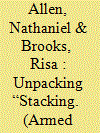| Srl | Item |
| 1 |
ID:
172857


|
|
|
|
|
| Summary/Abstract |
African elites commonly recruit co-ethnic soldiers into state security institutions, a practice known as ethnic stacking. Ethnic stacking has recently received considerable attention from scholars and been linked to authoritarian repression, coups, and political violence. This article employs evidence from Sudan to argue that ethnic stacking is not one coherent tactic but several, and can manifest across multiple identities, multiple institutions, and at different points in the security force hierarchy. Moreover, the effects of ethnic stacking can be mediated by which institutions are stacked and whether stacking is restricted to the leadership or encompasses an entire security force.
|
|
|
|
|
|
|
|
|
|
|
|
|
|
|
|
| 2 |
ID:
188798


|
|
|
|
|
| Summary/Abstract |
This article unpacks the phenomenon of identity-based stacking in armed forces to lay the groundwork for a next generation of scholarship, proposing three sets of extensions with examples from regimes in Africa and the Middle East. First, we argue that scholars might treat the concept of stacking with greater nuance by considering variation in stacking’s modal forms, incorporating identities beyond ethnicity, considering how the salience of stacking varies within armed forces, and treating the identities on which stacking is based as malleable. Second, we argue for a more attention to the mechanisms through which stacking operates, such that it can involve layering of multiple bases of identity, be used to manipulate and manufacture identity, and be used to induce in-group competition and rivalry. Finally, stacking scholarship should consider more the costs to a leader’s control over policy and distributional matters and emphasize the trade-offs that various forms of stacking generate among regime security imperatives.
|
|
|
|
|
|
|
|
|
|
|
|
|
|
|
|